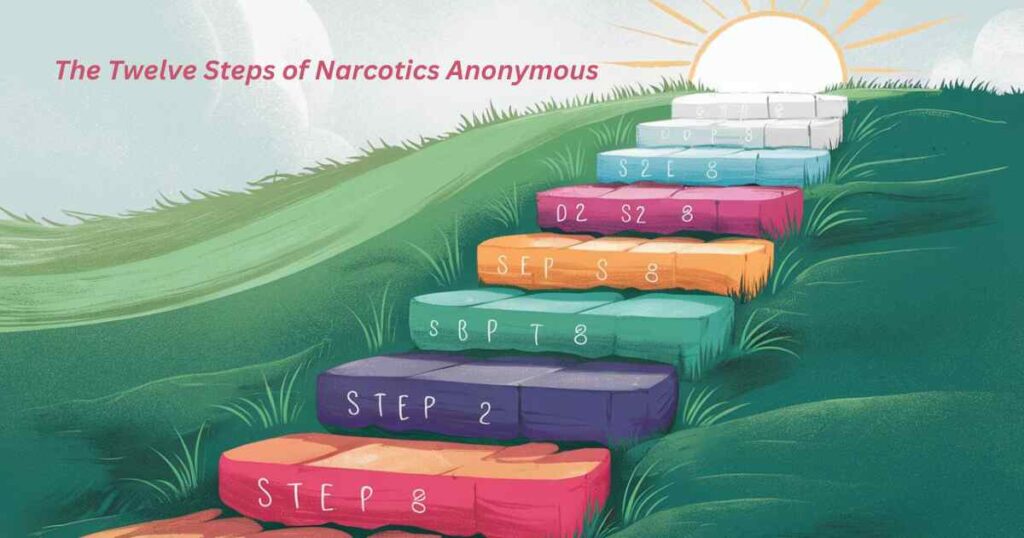The spiritual principles of Narcotics Anonymous (NA) guide individuals toward recovery by promoting honesty, humility, and personal responsibility. These principles offer a foundation for healing, helping members find inner peace and strength through a supportive community.
By following these principles, many experience growth, renewal, and a sense of purpose on their recovery journey.
What Is Narcotics Anonymous?
Narcotics Anonymous (NA) is a support group that assists individuals who are struggling with drug addiction and substance abuse. It is a global network where individuals come together to share their experiences and gain strength from each other. NA operates similarly to Alcoholics Anonymous (AA) but focuses primarily on substance abuse rather than alcohol.
One key aspect of NA meetings is their focus on spirituality, though it is not religious. Members are encouraged to connect with a higher power, any belief or concept that gives them the strength to change. This spiritual guidance plays a central role in helping individuals on their recovery journey.
In the NA recovery process, members follow a set of core steps and principles, which are designed to address not just the addiction itself but also the underlying issues that fuel it. NA principles provide the framework for living a healthier, substance-free lifestyle through honesty, acceptance, and willingness.
Exploring the Spiritual Principles of Narcotics Anonymous

Spiritual principles are central to the 12-step recovery process in Narcotics Anonymous. These principles provide a guide for members to not only stop using drugs but also to heal emotionally and spiritually.
The spiritual principles cover everything from self-awareness to helping others in their recovery journey. They emphasize values like honesty, courage, and service, which are critical for lasting change.
By internalizing these principles, individuals learn to confront their issues with integrity and make meaningful progress in their sobriety journey.
These principles teach individuals that the addiction recovery process isn’t just about overcoming cravings but about encouraging a life of spiritual growth and personal transformation.
Many people find that by practicing these values, they can find the strength to achieve lasting sobriety and make a positive impact on their communities.
Acceptance
Acceptance is about coming to terms with the reality of one’s addiction. This spiritual principle asks individuals to let go of denial and face the truth, that is the first step toward healing.
Hope
Hope is the belief that a better future is possible. In NA, hope motivates individuals to keep going, even when recovery feels difficult or impossible. Hope can keep you out of stress and pain if you are stressed.
Faith
Faith in the NA program means believing in the possibility of change and having trust in the 12-step process and in a higher power that provides guidance. Praying and meditations strengthen the faith.
Courage
Courage is needed to face the challenges of recovery. It takes bravery to confront painful truths and step into a new, sober life. Building courage helps you maintain healthier habits, set boundaries, and face new challenges.
Honesty
Honesty is one of the most important spiritual principles in NA. Members can make real progress in their recovery journey by being truthful with themselves and others.
Awareness
Awareness is about staying mindful of behaviors, triggers, and emotions that could lead back to substance abuse. This is key to maintaining sobriety.
Patience
Patience is vital for navigating the ups and downs of the recovery process. Lasting addiction recovery takes time, and rushing the process can lead to setbacks.
Humility
Humility helps individuals recognize their limitations and ask for help when needed. This principle is essential for building strong relationships and a support network.
Willingness
Willingness opens the door to change. Even the best addiction treatment or program won’t be effective without it. A person must be open to new ideas and approaches.
Love
Love, especially self-love, is a core component of healing. The kind of love emphasized in Narcotics Anonymous isn’t romantic. Members are encouraged to practice kindness and compassion for themselves and others.
Integrity
Integrity means aligning one’s actions with one’s values. In NA, this principle helps members stay true to their goals and maintain sobriety.
Discipline
Discipline involves maintaining consistent habits and routines that support recovery. Without discipline, it can be easy to fall back into old patterns of substance abuse.
Service
Service means giving back to others. In NA, this principle involves helping others in their recovery journey, which strengthens one’s sobriety.
Perseverance
Perseverance is the determination to keep going, even when things get tough. In NA, this is essential for overcoming small and large challenges in recovery.
How Do Spiritual Principles Help?

Spiritual principles help by providing a strong foundation for individuals to make positive changes in their lives. These principles, like honesty and humility, guide people to face their struggles and take responsibility for their actions. This leads to personal growth and better decision-making.
When someone follows these spiritual principles, they gain emotional strength to handle life’s challenges without turning to substances. Values like hope and faith offer comfort during tough times, giving them the confidence to move forward in their recovery journey.
By practicing spiritual principles, individuals can rebuild relationships and find inner peace. These values create a sense of purpose and connection to others, making the recovery process more fulfilling and meaningful.
Historical Background of Narcotics Anonymous

Narcotics Anonymous has a rich history that began with the recognition that people struggling with drug addiction. They needed a space where they could find support and healing. Alcoholics Anonymous deeply inspired the founding of NA. It quickly grew into an international network of people dedicated to sobriety.
Origins and Development of NA
Narcotics Anonymous (NA) began in the 1953s, inspired by the success of Alcoholics Anonymous. It was created by James Patrick Kinnon to help people struggling with drug addiction. offering support through meetings and the 12-step program. Over the years, it has grown into a global community, helping millions recover from substance abuse.
NA and Alcoholics Anonymous
In the 1950s, Alcoholics Anonymous had been helping people with alcohol addiction for nearly 20 years. Seeing its success, Kinnon adapted the 12-step program to support those struggling with all forms of substance abuse. This led to the creation of Narcotics Anonymous to address a broader range of addiction issues.
Core Spiritual Principles of Narcotics Anonymous
The core spiritual principles of Narcotics Anonymous are essential for members’ emotional and spiritual growth. These values guide them through the process of addressing their addiction and learning how to live a sober lifestyle. The principles of honesty, service, and love provide the moral backbone of the 12-step program and help individuals maintain their sobriety.
Each member of Narcotics Anonymous is encouraged to incorporate these values into their daily lives, enabling them to make better choices and remain committed to their sobriety. These principles provide a foundation for living with purpose, avoiding the traps of substance abuse, and sustaining long-term recovery.
The Twelve Steps of Narcotics Anonymous

The 12-step recovery model is the backbone of Narcotics Anonymous. Each step serves as a guide for personal reflection and growth, empowering members to take control of their recovery journey. These steps focus on acceptance, self-examination, and making amends. Below is an exploration of the 12 steps and how they relate to the spiritual principles of NA.
1. Admission of Powerlessness
The first step is acknowledging that one has lost control over their addiction. This admission is a humbling experience that forms the basis for the rest of the recovery process.
2. Restoration Through a Greater Power
The second step encourages belief in a higher power that can restore individuals to sanity. This doesn’t have to be a religious belief, but rather a force or energy that gives hope for recovery.
3. Giving Power to God
In this step, individuals give control of their lives over to their higher power. This act of surrender requires faith and trust in the recovery process.
4. Moral Inventory
Taking a moral inventory involves a deep, honest evaluation of one’s life. This step requires members to face their faults and wrongdoings without judgment, which is vital for emotional healing.
5. Admission of Wrongs
Sharing personal wrongdoings with another person is the next step. This openness helps relieve guilt and shame, clearing the way for true emotional recovery.
6. Readiness for Removal of Defects
Here, members express their willingness to let go of their character flaws. This readiness is crucial for transformation in the recovery process.
7. Humble Request for Removal of Defects
In the seventh step, individuals humbly ask their higher power to remove their shortcomings. This act of humility strengthens their commitment to recovery.
8. List of Persons Harmed
This step involves making a list of those harmed during addiction. Members begin to take responsibility for their actions, preparing for the next stage of making amends.
9. Making Direct Amends
Making amends is about repairing the damage caused by addiction. In this step, members directly address those they’ve hurt, taking tangible actions toward healing relationships.
10. Continuation of Personal Inventory
Regular self-examination is necessary for long-term sobriety. This step reminds individuals to keep themselves accountable and address any emerging issues.
11. Prayer and Meditation
Incorporating prayer and meditation into daily life fosters spiritual growth. This step encourages individuals to connect with their higher power regularly.
12. Providing Help for Others
The final step focuses on giving back. Members help others in their addiction recovery journeys, which strengthens their own sobriety and sense of purpose.
The Role of a Higher Power in Narcotics Anonymous

Narcotics Anonymous emphasizes the importance of a higher power in overcoming substance abuse. This higher power is not defined by any particular religion or belief system. Instead, it can be any source of strength that an individual believes in.
The Concept of a Higher Power
The higher power in NA serves as a spiritual guide. This concept helps members develop the faith and trust needed to navigate the challenges of recovery. It provides the emotional and spiritual support necessary for overcoming addiction.
Personal Beliefs, Spirituality, and Recovery
Personal beliefs and spirituality are unique to each individual. In NA, members are encouraged to explore their spiritual path, whether it involves traditional religion, nature, or another spiritual connection. This flexibility allows individuals to tailor their recovery process to what works best for them.
Challenges in Practicing Spiritual Principles
While the spiritual principles of Narcotics Anonymous are powerful, practicing them can be challenging. Individuals may struggle with the vulnerability required to be honest, or they may find it difficult to surrender control to a higher power. These challenges are part of the recovery process and must be met with perseverance and patience.
Impact of Spiritual Principles on Recovery
The positive impact of spiritual principles on the recovery journey is profound. These principles help individuals cultivate emotional resilience and develop the tools needed to handle life’s challenges without resorting to substances.
Many individuals in NA credit the spiritual principles for not only helping them stop using drugs but also for transforming their lives in deeper, more meaningful ways. Members can rebuild their lives with purpose and direction, creating a strong foundation for lasting sobriety by focusing on values like honesty, humility, and service
Narcotics Anonymous Meetings and Community Support
NA meetings play a crucial role in the recovery process by providing a safe space where individuals can share their experiences and receive support from others. These meetings foster a sense of community, which is vital for sustaining long-term sobriety.
The peer-led nature of NA helps create an atmosphere of mutual respect and encouragement. Members not only receive help but are also allowed to offer support to others, which strengthens their own recovery journey.
Contact Long Island Intervention
For those seeking additional support, Long Island Intervention offers comprehensive services. They combine spiritual principles with other forms of addiction treatment, like therapy and detox.
It ensure that individuals receive holistic care. If you’re struggling with substance abuse and need a support system, contact Long Island Intervention for assistance.
Frequently Asked Questions
What Are the 12 Spiritual Principles of Narcotics Anonymous?
The 12 spiritual principles of Narcotics Anonymous are Acceptance, Hope, Faith, Courage, Honesty, Patience, Humility, Willingness, Love, Integrity, Discipline, and Service. These principles guide members through their recovery journey.
What Are the Spiritual Principles of Step 8 NA?
The spiritual principle of Step 8 in NA is Willingness. It involves being ready to make amends to those you’ve harmed.
What Are the Spiritual Principles of Step 3 NA?
The spiritual principle of Step 3 in NA is Faith. It means deciding to turn your life over to a higher power.
How Do Spiritual Principles Affect Long-Term Recovery?
Spiritual principles provide ongoing guidance and support, helping individuals stay focused and resilient in their recovery journey.
Why Are Spiritual Principles Important in NA?
Spiritual principles offer a foundation for personal growth and a supportive framework for overcoming addiction
Conclusion
Narcotics Anonymous uses a 12-step program and spiritual principles to help people recover from addiction. These principles give a strong foundation for emotional and spiritual growth, guiding people through the challenges of recovery.
Key principles like acceptance, honesty, and service are essential in helping members overcome addiction and rebuild their lives. With the support of the community and a connection to a higher power, members can find healing, personal growth, and long-term sobriety.
Also Read: What Does the Number 11 mean Spiritually?
Also Read: Spiritual Meaning of a Burning House in a Dream
Also Read: Biblical Meaning of a Child Dying in a Dream
Also Read: Spiritual Yellow Butterfly Meaning in the Bible

Welcome! I’m happy you’re here. My name is john, and this blog is dedicated to exploring the spiritual and biblical meanings of daily life. I started this blog to share insights and ideas that infuse your living space with purpose and harmony.
